#Arab-Islamic Summit
Text
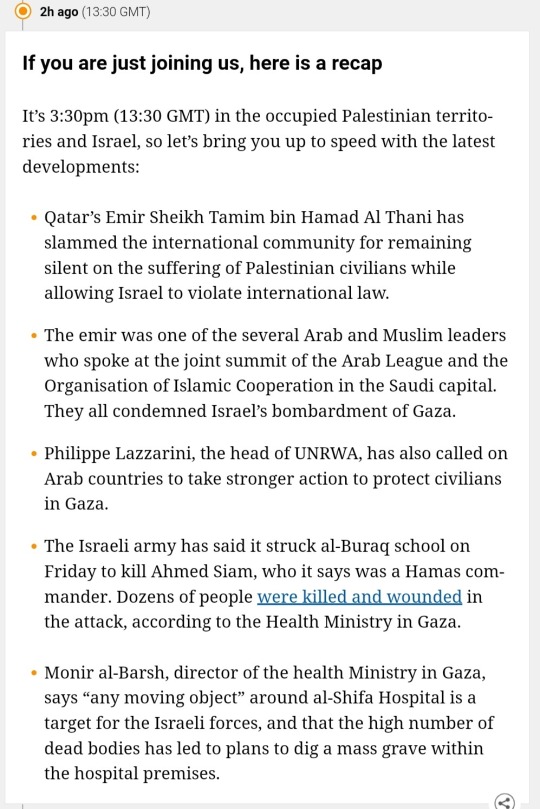
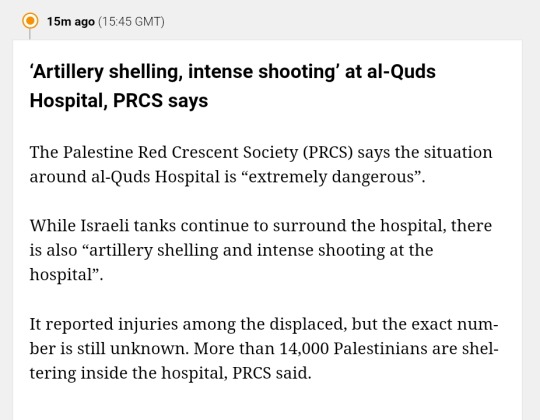
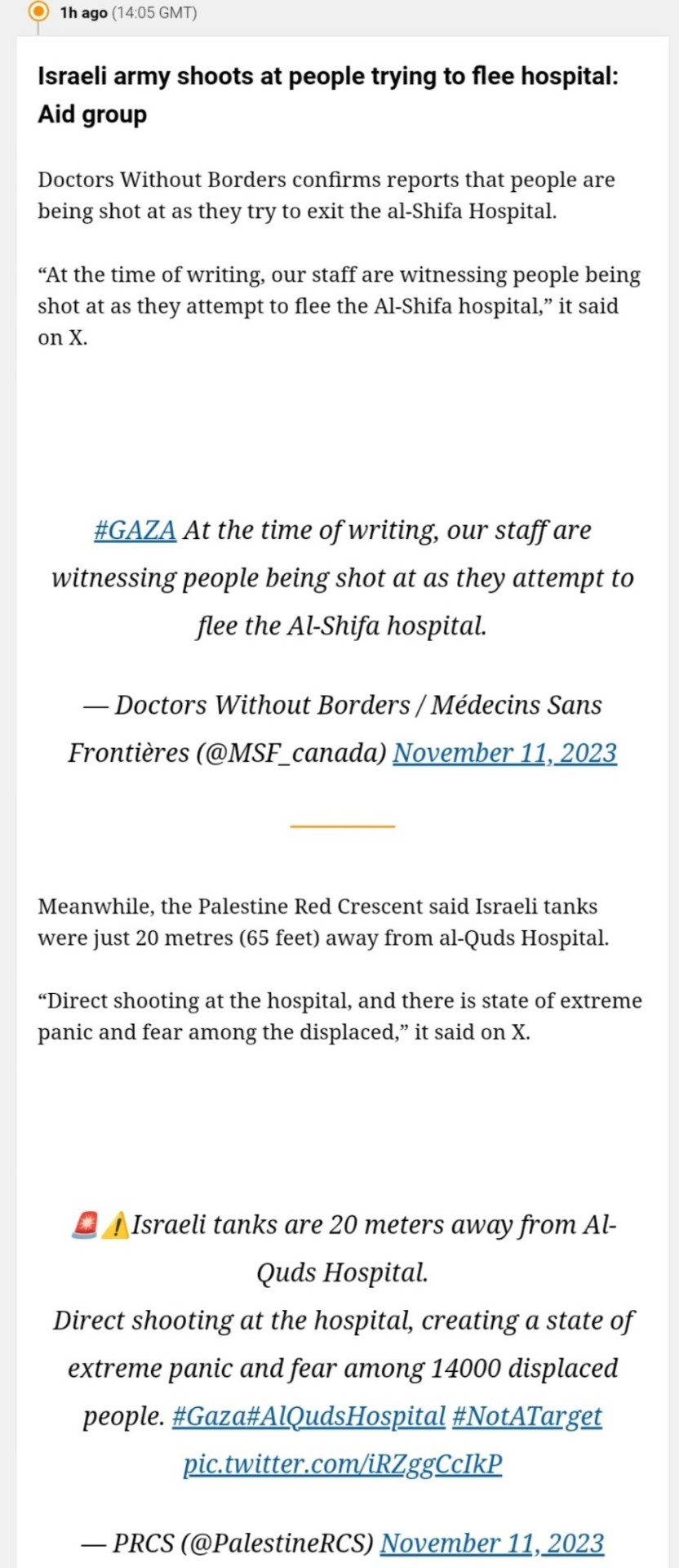


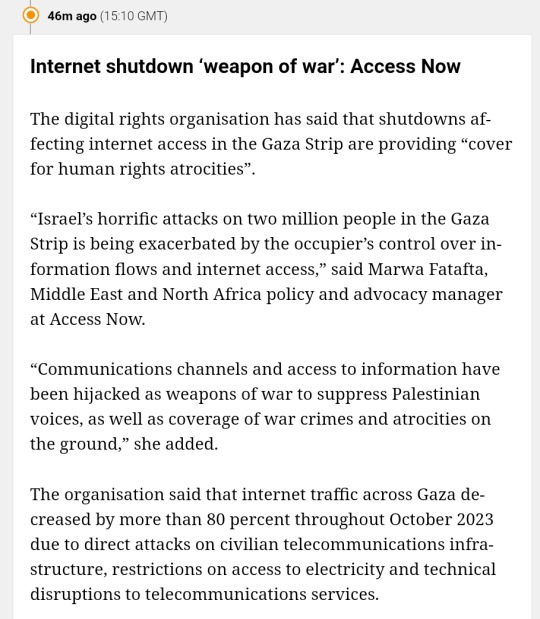
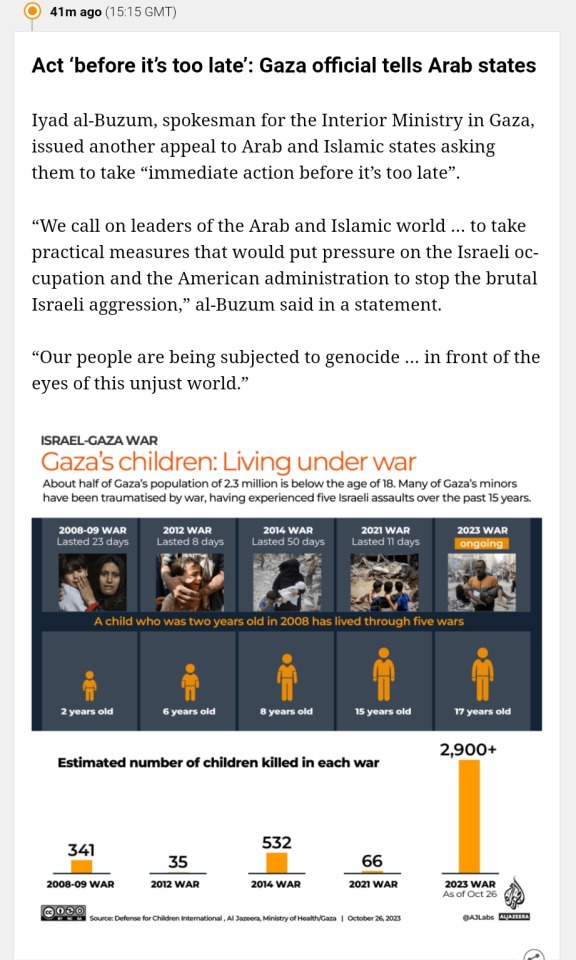

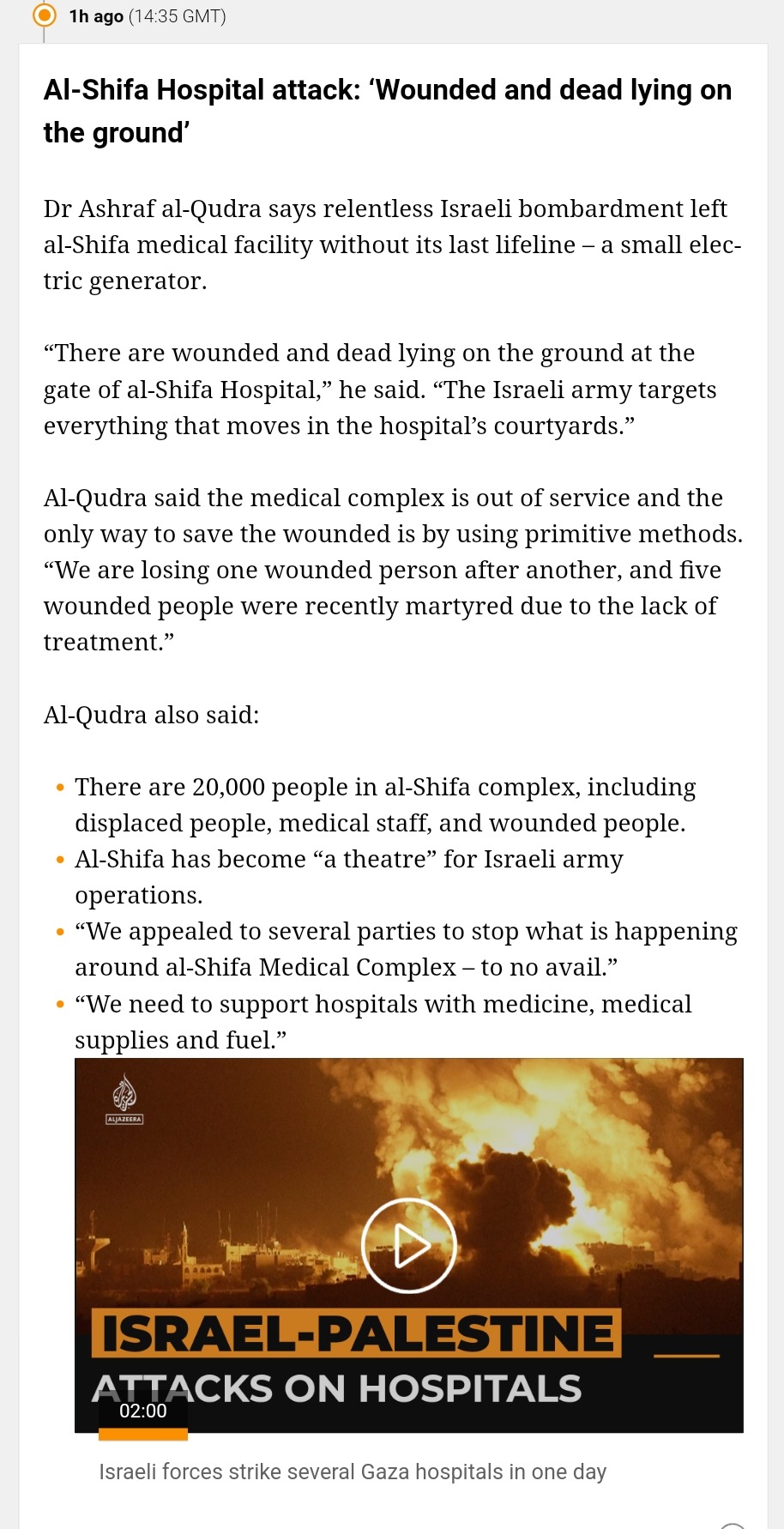

Live coverage of the 11th of November 2023 has now begun.
Here is an amalgamation of news from the last 2 hours.
It is not fucking good.
#free gaza#free palestine#gaza strip#irish solidarity with palestine#palestine#gaza#news on gaza#al jazeera#boycott israel#israel#al quds hospital#Al-Shifa Hospital#Arab-Islamic Summit#Tamim bin Hamad Al Thani#The Arab League#The Organisation of Islamic Cooperation#philippe lazzarini#Youmna Elsayed#Doctors Without Borders#Palestinian Red Crescent Society#Ashraf al-Qudra#Iyad al-Buzum#Guy Shalev#Muhammad Abu Salmiya#Youssef Abu al-reesh#Summary#Recap#Amalgamation#Current events#Latest news
139 notes
·
View notes
Text
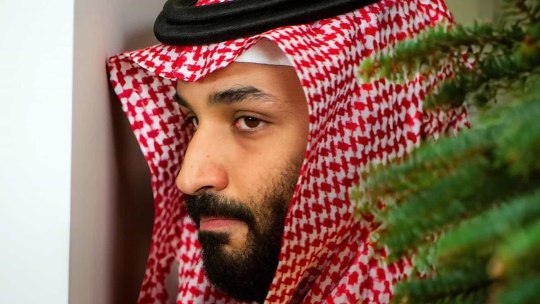
There was a lot of anti-Israel rhetoric from the Arab League and Organization for Islamic Cooperation summit in Riyadh.
But interestingly, none of the big anti-Israel resolutions were able to pass. All of them, including an Iranian motion to designate the IDF as a terrorist organization, were blocked by several Arab states, including Saudi Arabia.
33 notes
·
View notes
Text
Assad met Mauritanian President Mohamed Ould Ghazouani, but there's no pictures
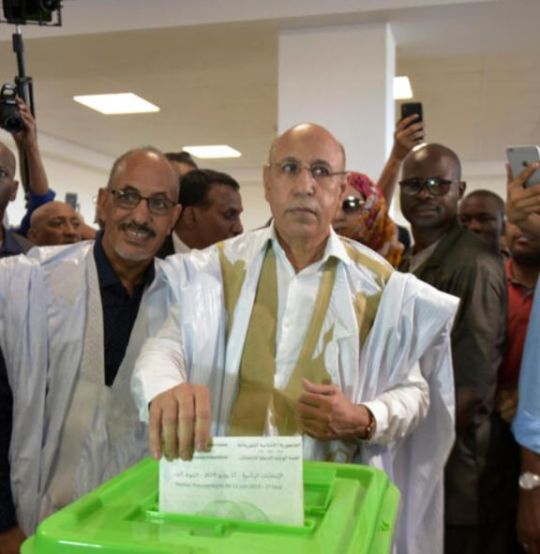
This is Mauritanian President Mohamed Ould Ghazouani, but I'm gonna tell my kids it's... 😂

#Assad#Bashar al-Assad#Syria#Mohamed Ould Ghazouani#Mauritania#Riyadh#Saudi Arabia#Arab Summit#Arab and Islamic Countries Summit#Gaza#Gaza Strip#Palestine#Saif al-Islam Gaddafi#Libya#Nutella B-Ready#Nutella
4 notes
·
View notes
Text
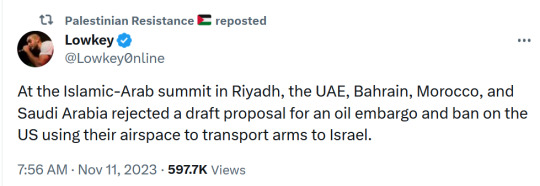
(Nov. 11)
@Lowkey0nline: At the Islamic-Arab summit in Riyadh, the UAE, Bahrain, Morocco, and Saudi Arabia rejected a draft proposal for an oil embargo and ban on the US using their airspace to transport arms to Israel.
378 notes
·
View notes
Text
Iranian President Ebrahim Raisi arrived in Saudi Arabia on Saturday to attend a summit on Gaza, making him the first Iranian president to visit the Gulf kingdom in years, after a thaw between the longtime rivals earlier this year saw them restore diplomatic ties.
Raisi was seen greeting Saudi officials after landing at the airport. He donned the traditional Palestinian keffiyeh scarf.
President Ebrahim Raeisi of Iran says the Israeli regime must be brought to justice in international courts over its genocide of the Palestinian people in the besieged Gaza Strip.
Raeisi made the remarks while addressing the joint emergency meeting of the Arab League and the Organization of Islamic Cooperation (OIC) on the issue of Gaza in Riyadh, the capital of Saudi Arabia, on Saturday.[...]
“Now that the international assemblies under the influence of the United States are suffering from indecisiveness, and lack of character and identity, we must take the field.”
The president said the Arab and Muslim countries shoulder the responsibility towards the issue of Palestine and the oppressed people of Gaza.
Raeisi proposed Iran’s 10 urgent solutions and suggestions for the benefit of the Palestinian nation.
The president urged Muslim leaders attending the summit to take a “decisive and swift” decision in favor of Palestinians.
Raeisi said the United States and Israel must be obliged to accept an immediate halt to the war machine.
The Iranian president gave primacy to the complete lifting of the human blockade of Gaza and immediate and unconditional reopening of the Rafah border crossing in cooperation with Egypt to send humanitarian aid to people in Gaza as Iran’s second proposal.
The president said the pressure exerted by the US and its Western allies is by no means an excuse to close borders.
As Iran’s third offer, Raeisi urged Israel’s immediate military withdrawal from Gaza, saying the Gazan territory belongs to Palestinians and not those who act under the command of the US and Israel.
He warned all countries, including Muslim nations, to be cautious about any American-Zionist plot under the pretext of ensuring security in Palestine.
Raeisi said Iran’s fourth proposal urges all Muslim countries to terminate any political and economic relations with Israel. He said economic sanction, particularly in the energy sector, against the regime must figure high on the agenda.
As Iran’s fifth offer, the president called on all Muslim countries to label the Israeli regime’s army a terrorist organization. He stressed the importance of establishing an international court to prosecute the criminal leaders of Israel and the US, particularly those who have played a role in the genocide in Gaza.
The president called for the establishment of a special fund for the immediate reconstruction of Gaza with the acceptance of the Muslim countries attending the summit
Referring to an Israeli airstrike on Al-Ahli Baptist Hospital in the besieged Gaza Strip, which killed at least 500 Palestinians, the president said October 18 should be named as the day of genocide and crime against humanity.
If Israel keeps its crimes going in the “unequal war,” Raeisi said, Muslim countries must arm the Palestinian people and help them fight the occupying warmonger. The president undercored the importance of the liberation of Palestine “from the river to the sea” as a permanent and democratic solution.[...]
The president said the US is the main perpetrator and accomplice in Israel’s war crimes in Gaza. Israel is the “illegitimate child of America,” Raiesi said.
“It is America that has preferred support it over the sacred lives of thousands of oppressed Palestinian children. By immediately forming its security cabinet in the occupied territories, America encouraged the Zionist regime to carry out criminal operations against the helpless people of Gaza and called it legitimate defense,” the president said.
The claim of legitimate defense is “one of the bitter ironies of history, which goes against any established legal rules and international standards,” the president said.
He said the US sent its warship to the region to effectively enter the war on behalf of Israel.
“The all-out support of the Zionist regime in the UN Security Council and preventing the adoption of a resolution to stop the genocide of Palestinians in Gaza was another service of America to the aggressors, allowing them to conduct war crimes more than ever,” Raeisi stated.
11 Nov 23
78 notes
·
View notes
Text

OPEDS

Is it time to go?
By Howard Sackstein
Today, the South African Jewish community numbers but one third of what it did at its peak. Though our numbers have shrunk, the vibrancy of our community has remained intact.
In the 1970s and 1980s they used to joke, “When the Jews go; it’s time to leave, when the Portuguese go; it’s too late.”
The clock ticked, and stopped on 7 October 2023.
The behaviour of the South African government was nothing short of betrayal. President Cyril Ramaphosa’s failure to condemn the 7 October massacre; his failure to reach out to the families of the two South Africans massacred in the Hamas genocide; his failure to act on the two South Africans kidnapped by Hamas; and his smirk blame of Israel for deserving the attack two weeks after the massacre, while wearing a Palestinian keffiyeh, will forever be a symbol of his Judas moment.
In American politics, they talk of a “tortoise on a lamppost”. Sometimes, the tortoise mistakenly believes that it got onto the lamppost by itself.
Ramaphosa’s spineless leadership has allowed his jihadist foreign minister, Dr Naledi Pandor, and her mujahidin director general, Zane Dangor, to direct foreign policy without intervention. Pandor mislead Parliament by claiming that there were no beheadings of babies and that Israel had attacked the Al-Ahli Arab Hospital. With no South African diplomats in Israel and Al Jazeera as her only source of information, Pandor meanders in the dark. Her ignorance, however, is self-inflicted. Her department was invited to view the 47-minute video of Hamas-captured atrocities, and declined to attend.
Hamas informs us that Pandor telephoned it to congratulate it on the success of its “Al-Aqsa Flood” attack on Israel. Pandor claimed that she was merely offering humanitarian assistance, but refused to release the “call-out” transcript of the conversation. As a convert to Islam, Pandor uses her own zealotry to pursue a pro-Hamas agenda to the detriment of South Africa.
In December, Hamas visited South Africa, was feted in our Parliament, and celebrated in the African National Congress’ (ANC’s) offices in Johannesburg. When Ramaphosa finally met the South African Jewish Board of Deputies, he sprinted to issue a statement and later, while meeting the Muslim community, stated that they had issued a statement as “we’re concerned there are distortions”. Given that the president’s statement was issued first, this both makes no logical sense and effectively paints the official representative body of Jews in South Africa as liars.
It’s a clash of civilizations. Jews have traditionally ascribed to the values of Western liberal democracy. In the ANC’s hard-left, revolutionary world view, Western interests must be opposed everywhere – in Ukraine, in Morocco, and in Israel. South Africa believes that it must be the vanguard liberation movement celebrating the imagined successes of Iran, Cuba, Venezuela, and Russia. Pandor is currently attending the 7th Africa-Cuba Solidarity Conference in White River.
But actions have consequences. The West is becoming increasingly disenchanted by South Africa’s antics. Last year, South Africa’s invitation to the G7 Summit didn’t materialise, and the currency has lost 50% of its value under Ramaphosa. The renewal of the African Growth and Opportunity Act looks increasingly precarious together with the approximately 250 000 jobs it created. South Africa is increasingly isolated from those countries which could help it the most.
Ramaphosa had a choice to turn South Africa into a Singapore or a Sudan. He chose Sudan.
40 notes
·
View notes
Text

November 11 2023
Via al jazeera
Transcript:
If you are just joining us, here is a recap
It’s 12:45am (22:45 GMT) in the occupied Palestinian territories and Israel, so let’s bring you up to speed with the latest developments:
Israeli tanks are just 20 metres (65 feet) away from al-Quds Hospital and firing at the facility with about 14,000 displaced people sheltering inside.
Al-Shifa Hospital’s director says two premature babies have died after being taken out of incubators because of power outages. He says the medical complex is “completely cut off, any moving person targeted” by Israeli forces.
Israeli troops conducted a raid in the occupied West Bank city of Jenin. At least one person was killed while another was shot dead in Arraba, a nearby town, according to the health ministry.
Arab and Muslim leaders concluded an emergency summit of the Arab League and Organisation of Islamic Cooperation where they condemned Israeli “aggression” on Gaza and demanded a ceasefire.
In his second speech since October 7, Hezbollah leader Sayyed Hassan Nasrallah said the armed group used new types of weapons and struck new targets in Israel, and pledged the front against Israel would “remain active”.
Hundreds of thousands of people took to the streets of London demanding an immediate ceasefire in Gaza and for the end of the Israeli occupation of Palestine.
At least 11,078 Palestinians have been killed in Israeli attacks on Gaza since October 7. In Israel, after a downward revision, the death toll now stands at more than 1,200.
#also. via abdallah al attar's telegram channel: al shifa lost power completely#also via another source: the indoniasian hospitals yard is a mass grave#but i have no source to confirm these with and thus you will read them here. unconfirmed
17 notes
·
View notes
Text
The US has used its veto at the UN security council to block a resolution calling for Israel to allow humanitarian corridors into the Gaza Strip, a pause in the fighting and the lifting of an order for civilians to leave the north of the besieged territory.
The text – supported by 12 of the 15 members of the security council on Wednesday – contained criticism of “heinous terrorist crimes by Hamas” and made no direct reference of Israel. In an attempt to win US support, the draft resolution did not explicitly call for a ceasefire, instead referencing a “humanitarian pause”.
But the US ambassador to the UN, Linda Thomas-Greenfield, said the resolution, carefully crafted by Brazilian diplomats, was unacceptable because it made no mention of Israel’s right to self-defence. The UK abstained, saying the resolution lacked mention of the way Hamas was using ordinary Palestinians as human shields.
The US ambassador said she was horrified and saddened by the loss of life, but that the actions of Hamas had brought about the humanitarian crisis. She also called for time to let Joe Biden’s diplomacy play out.
Israel thanked the US for using its veto. China described the move as “nothing short of unbelievable” while Russia said it was an example of US double standards.
Two members of the G7 on the council – Japan and France – broke with the US by backing the motion.
The draft resolution also called for “humanitarian pauses to allow full, rapid, safe and unhindered humanitarian access for United Nations humanitarian agencies”. Its failure to pass represented another blow to the authority of the world body.
Meanwhile, a meeting of the 59-strong Organisation of Islamic Cooperation in Riyadh accused Israel’s forces of targeting al-Ahli Arab hospital in Gaza.
Tuesday’s explosion, which killed hundreds, was blamed by Palestinian officials on an Israeli airstrike. Israel said it was caused by a failed rocket launch by the Palestinian Islamic Jihad militant group, which denied responsibility.
Israel has been using media and diplomatic channels to try to convince leaders of Arab countries that blast was caused by militants, after even its regional allies rushed to blame it for the explosion.
In the only sign of a reassessment by Arab states, the United Arab Emirates ambassador to the UN, Lana Zaki Nusseibeh, called for an independent investigation into the hospital strike and said anyone found guilty should be held to account. But she said regardless of the culprit, the death toll of Palestinians was unacceptable.
The dispute over responsibility may have little resonance among the Arab public. A former French ambassador to the US, Gérard Araud, said: “The truth about who was responsible for the Gaza hospital strike is now irrelevant. Public opinion has decided: Israel is the culprit. All the explanations won’t do anything. This is a major defeat for Israel. It will have political consequences.”
Arab state foreign ministries have issued individual statements condemning Israel for the explosion, including Bahrain, which established ties with Israel in the Abraham Accords of 2020.
Morocco, another country that recognised Israel in 2020, also blamed it for the strike, as did Egypt, which became the first Arab country to normalise relations in 1979.
Saudi Arabia, which has ended talks on potential ties with Israel since the Israel-Hamas war flared, called the blast a “heinous crime committed by the Israeli occupation forces”.
The rapid apportioning of blame coincided with angry rallies across the region, with more planned on Wednesday after calls for a “day of rage”.
A mini-summit between Joe Biden and Arab states, as well as the leader of the Palestinian Authority, Mahmoud Abbas, was due to be held in Amman on Wednesday, but has been cancelled. The Jordanian foreign minister, Ayman Safadi, said the summit would be held only “when the decision to stop the war and put an end to [the] massacres” was taken.
The authority of most Gulf monarchies is secure, but they know what they risk if they are seen to be siding with Israel’s version of events at present. The popularity of Abbas, seen as a security subcontractor for Israel by some Palestinians, was already at a low ebb.
Years of patient work trying to build a new relationship between Israel and some Arab states looks set to be undone, a trend that will delight hardliners in Iran, Lebanon and Palestine. Some extremists in the Israeli government also have no interest in a relationship with Arab states if it involves compromise over the Palestinian question.
The Egyptian president, Abdel Fatah al-Sisi, issued a warning that he could unleash protests inside Egypt if Israel did not back down.
He again said Israel was seeking to expel Palestinians over the Gaza southern border into the Sinai peninsula and said to Israel: “The Negev Desert [about 4,500 sq miles of land in southern Israel] is before you if you want to displace Palestinian citizens, but not Sinai, and then Sinai will not become a base to attack you and for you to use it as an excuse to attack Egypt.”
He has been demanding Israel allow aid into Gaza through the Rafah crossing into Egypt, but only with US-backed Israeli assurances that Israel will not attack the convoys. Israel fears the convoys will contain ammunition for Hamas, a central issue in the talks between Israel and the US secretary of state, Antony Blinken.
#un security council#us foreign policy#israel palestine conflict#organization of islamic cooperation#al ahli baptist hospital
19 notes
·
View notes
Text
What will become of Hamas after the end of its war against Israel? Given the organization’s ties to and support from Iran, its long-term future remains connected to the broader issue of Tehran’s role in the Middle East. The future connection of Iran to whatever remains of Hamas will overshadow any short- or medium-term scenarios in the Hamas-Israel war. If the United States is serious about eliminating the threat presented by Hamas to Israel, the Palestinian Authority, and Middle East stability, the United States must acknowledge the centrality of Iran’s destabilizing activities across the region and address it seriously.
Israel is not yet presenting a coherent scenario regarding the postwar governance of Gaza—beyond being clear about who Israel does not want to govern Gaza: the leadership of the military wing of Hamas. Israel is framing its assault on Gaza as necessary for the achievement of the objective of eradicating this military leadership, which in more concrete terms likely means the pursuit and killing of figures like Yehia Sinwar, Hamas’s Gaza Strip leader; Mohammed Sinwar, a military operations leader; Mohammed Deif, leader of Hamas’s military wing, the Izz ad-Din al-Qassam Brigades; and Saleh al-Arouri, the brigades’ co-founder.
But as was the case with other militant groups connected to Iran, decapitating a group by eliminating its military leaders does not result in the group’s dissolution. The killing of Hezbollah leaders did not cause that organization to collapse, nor did the Islamic Revolutionary Guard Corps’ Quds Force dissolve after the killing of its chief, Qassem Suleimani. The Iran-supported Popular Mobilization Forces are also still in existence in Iraq, despite the killing of the group’s deputy head and most powerful figure, Abu Mahdi al-Muhandis.
For as long as Iran regards these militant groups as necessary to its regional influence, it will continue to support them and allow them to regenerate themselves after military setbacks and leadership losses. Although Hamas is not Iran’s most important regional asset, Tehran will not give up its Palestinian cards easily. After all, it is the Palestinian cause that Iran uses as an excuse for its support of militant groups across the Middle East, presenting those groups as part of an “axis of resistance” against U.S. imperialism and Zionism.
Iran is not the only country that has benefited from Hamas. Israeli Prime Minister Benjamin Netanyahu supported Hamas’s rule in Gaza to bolster his political standing within Israel. Despite Egypt’s antagonism toward the Muslim Brotherhood, of which Hamas is an offshoot, Cairo sees Hamas as a useful security actor that has managed to keep the military dynamics in Gaza from spilling across the border and creating instability inside Egypt. Cairo will not readily accept an alternative to Hamas unless it comes with credible security guarantees.
Despite Israel’s hard-line rhetoric about Hamas, if it succeeds in eliminating Hamas’s military leaders in the short term, a medium-term scenario of Arab-Israeli acceptance of a minor role for a reformed version of Hamas is not far-fetched. Such an iteration of Hamas would be in line with the statement issued following the joint Arab League-Organization of Islamic Cooperation (OIC) summit in Riyadh earlier this month. The statement emphasizes recognizing only the Palestine Liberation Organization (PLO) as the legitimate representative of Palestinians—but also states that all other Palestinian factions should operate “under a PLO-led national partnership.”
At first glance, the national partnership proposed in the Arab League-OIC statement appears more nuanced than the usual power-sharing arrangements among ruling elites that are a common feature of conflict resolution in the region. The proposal is not calling for power sharing between the PLO and Hamas. Rather, the idea is that Hamas—or at least its pragmatic elements—agrees to operate as a subsidiary political actor under the umbrella of the PLO. In theory, this kind of arrangement could mitigate the power abuses and political paralysis that elite bargains have frequently created in places like Lebanon, Iraq, or Libya.
Whether Hamas will go along with this plan is questionable. One of Hamas’s objectives in the Oct. 7 assault on Israel was to highlight the weakness of the PLO and Palestinian Authority, affirming that Hamas is the only true voice of the Palestinian people. Hamas will not want to be seen as having made a huge political compromise.
Some figures from the political leadership of Hamas who are abroad—especially the group’s Qatar-based political leader, Ismail Haniyeh—will likely accept becoming a part of the proposed national partnership. On Nov. 9, Haniyeh led a delegation that included the leader of Hamas’s diaspora office, Khaled Meshaal, to meet with Egyptian intelligence chief Abbas Kamel in Cairo. Haniyeh has also been involved in discussions with other Arab countries. Behind-the-scenes talks among Egypt, Qatar, and the United Arab Emirates (UAE) since the war started point to the plausibility of Haniyeh playing the role of Hamas representative in a new Palestinian political coalition that would extend the rule of the Palestinian Authority from the West Bank to Gaza.
With Hamas enjoying popular support among Palestinians despite documented criticism of Hamas’s governance by the residents of Gaza before Oct. 7, forming this Palestinian national partnership would avoid the complete exclusion of Hamas from power. The political exclusion of Hamas could cause anger among some hardcore supporters and turn them into an insurgency with continued support from Iran—a scenario Arab states are aware of and wish to avert. For Tehran, on the other hand, minimal representation for Hamas in a future Palestinian coalition will not suffice.
Even if a figure like Haniyeh agrees to compromise and Hamas is drastically weakened militarily, the proposed PLO-led coalition is only a medium-term scenario. In the longer term, it is highly unlikely that an Iran-backed group such as Hamas would limit its ambition to a minor role in power.
Hamas’s founding charter was firm in its rejection of the existence of Israel and the two-state solution. Hezbollah’s founding charter was similarly rejectionist of the Lebanese secular state. Both groups revised their charters later on. Hamas’s new charter of 2017 gives tacit agreement to the formation of a Palestinian state according to the 1967 borders, which was echoed by Haniyeh in his recent remarks about accepting the two-state solution. Hezbollah gradually began integrating into Lebanese state institutions as a political actor, taking part in parliamentary elections since 1992 and becoming part of the government. Hezbollah’s revised manifesto of 2009 presents the group as a political player within the Lebanese state.
But parallel to Hezbollah’s gradual integration into the Lebanese state, the group escalated its intimidation of political opponents as part of a long-term power-grab strategy. In 2008, this resulted in a de facto change in the Lebanese constitution, whereby Hezbollah was granted official legitimacy as an armed defender of Lebanon operating separately from the Lebanese Armed Forces. Since then, Hezbollah has continued its aggressive pursuit of power, and today it is the leading political force in Lebanon. Even if it chose a pragmatic path to power, it has not given up on its ambition to control Lebanese politics and advance Iran’s regional influence.
The story of Hezbollah illustrates that Iran-backed groups will not be satisfied with a minor political role in the long term. If Iran keeps backing them, they will take advantage of their presence in power to act as spoilers and claim greater clout. As long as Iran remains in the picture as their supporter, those groups remain Iranian influence tools no matter how pragmatic they may appear.
If the joint Arab League-OIC statement proposal can be implemented, it would be only a medium-term solution. It would give Arab countries and Israel time to engage in a revived peace process under the terms of the Arab Peace Initiative of 2002. It maintains Egypt’s security ties with Gaza and Qatar’s political ties with the pragmatic elements of Hamas. And it allows Saudi Arabia to resume normalization talks with Israel.
Iran, on the other hand, does not want the Israel-Palestine conflict to be resolved. And it will not want to see the Palestinian Authority make political gains at the expense of Hamas, especially after Hamas stated that its Oct. 7 attack succeeded in “putting the Palestinian issue back on the table.” Another likely reason for the timing and brutality of Hamas’s attack was to torpedo normalization between Saudi Arabia and Israel, to which Iran is firmly opposed.
Even if Hamas is reduced to a rump organization in Gaza, Iran will weaponize local grievances to resurrect a version of Hamas in the long run. Like the pre-war Hamas, the new Iran-backed version will continue to be a spoiler. This is similar to Hezbollah in the early 1980s: When, in 1984, Israel-linked operatives killed Ragheb Harb, a key leader of the Shiite resistance, Hezbollah was still in its formative phase. By the following year, Hezbollah had issued its first charter and developed into a more coherent organization thanks to a mixture of local grievances and Iranian commitment.
While countries like Saudi Arabia and the UAE are engaged in various forms of de-escalation with Iran, neither of those countries is naïve about the threat that Iran poses to its interests in the region. Their de-escalation efforts are, to a large degree, driven by U.S. disengagement on the issue of Iran’s role in the Middle East, which has left those Arab countries alone in finding ways to reduce tension with Iran in the absence of alternatives.
Washington must take advantage of the Arab League-OIC statement to buy time to develop, together with its Arab allies, a comprehensive strategy toward Iran that puts Iran’s nuclear enrichment, ballistic missile program, regional interventions, and proxy groups in the same priority file—and connect that file to the Israel-Palestine peace process. Only by addressing the Iranian role in this comprehensive way can there be more clarity about what happens to Hamas after the war.
10 notes
·
View notes
Text
Live coverage of the 11th of November 2023 is now closed.
Here is a recap of the day's major events.

It's 12am in Ireland now so I have to go to bed.
I will be away tomorrow for a scheduled break, unless something happens there will be no posts, but I will be back to post a fresh livelink at midnight until I resume normal reports on Monday afternoon.
For continuous updates while I'm gone, click the link below:
#free gaza#free palestine#gaza strip#irish solidarity with palestine#palestine#gaza#news on gaza#al jazeera#boycott israel#israel#Al-Shifa Hospital#Muhammad Abu Salmiya#Palestinian Red Crescent Society#Arab-Islamic Summit#The Arab League#The Organisation of Islamic Cooperation#Tel Aviv#Protest#New York#London#Karachi#Baghdad#Berlin#Edinburgh#Ireland#Ireland also had one it's just not mentioned#Recap#Summary#Current events#Goodnight
32 notes
·
View notes
Text

17 April 2024: King Abdullah II and Bahrain King Hamad bin Isa Al Khalifa held talks in Aqaba, stressing the need to maintain Arab coordination to bolster solidarity and joint action.
His Majesty and King Hamad noted the importance of the upcoming Arab Summit, which will be held in Bahrain, in light of current regional conditions.
His Majesty commended Bahrain’s ongoing efforts to organise the summit, during the meeting attended by Crown Prince Hussein and Sheikh Nasser bin Hamad Al Khalifa, the Bahraini monarch’s representative for humanitarian work and youth affairs.
The meeting also covered the strong ties between the two countries and peoples, with His Majesty and the Bahraini monarch expressing pride in the deep-rooted bilateral relations and keenness to enhance cooperation and achieve economic integration.
King Hamad congratulated His Majesty on the 25th anniversary of assuming his constitutional powers, commending development and stability in Jordan, under His Majesty’s leadership.
His Majesty also congratulated the Bahraini monarch on the 25th anniversary of his accession to the throne, commending his efforts in enhancing progress, development, and prosperity in Bahrain.
Discussions covered regional developments, with King Hamad commending Jordan’s active efforts towards regional peace, and its support for Arab and Islamic causes, foremost of which is the Palestinian issue.
Talks also touched on the dangerous situation in Gaza, with the two leaders stressing the urgent need for the international community, especially the UN Security Council, to implement ceasefire resolutions in Gaza.
The two leaders reaffirmed the need to protect civilians, deliver humanitarian aid though all possible methods, and avoid further escalation, voicing rejection of all action that could expand the war or the Israeli ground offensive on Rafah, or displace the Palestinians.
His Majesty and King Hamad stressed the importance of de-escalation in the Middle East and reaching just, peaceful, comprehensive, and sustainable solutions to regional conflicts, and coordinating efforts to counter terrorism.
The two leaders called for preserving the historical and legal status quo in Jerusalem, and stopping Israeli violations against holy sites in the city.
King Hamad stressed the importance of the Hashemite Custodianship of Islamic and Christian holy sites in Jerusalem.
In addition, the two leaders warned of Israeli settler violence against Palestinians in the West Bank, denouncing the establishment of settlements in the occupied Palestinian Territories, which violates international law.
Their Majesties called for unifying Arab and international efforts towards just and lasting peace in the region, and supporting Palestinians’ right to self-determination, as well as the establishment of their independent state on the 4 June 1967 lines with East Jerusalem as its capital, on the basis of the two-state solution, and in line with relevant UN resolutions.
Prime Minister Bisher Khasawneh, Director of the Office of His Majesty Jafar Hassan, General Intelligence Department Director Maj. Gen. Ahmad Husni, and the accompanying Bahraini delegation of senior officials attended the meeting.
His Majesty and Crown Prince Al Hussein had received King Hamad upon arrival at the King Hussein International Airport in Aqaba, and later bade him farewell upon departure.
2 notes
·
View notes
Text
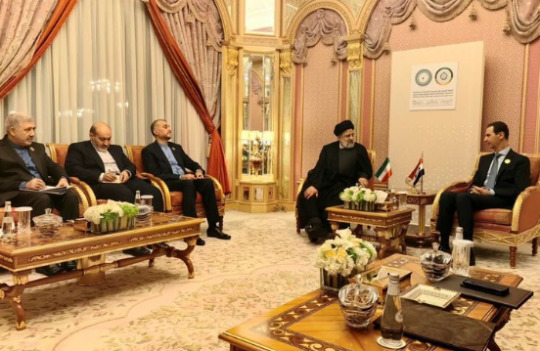
Syrian President Bashar al-Assad meeting Iranian President Ebrahim Raisi and his delegation in Riyadh, Saudi Arabia today, 11 November 2023
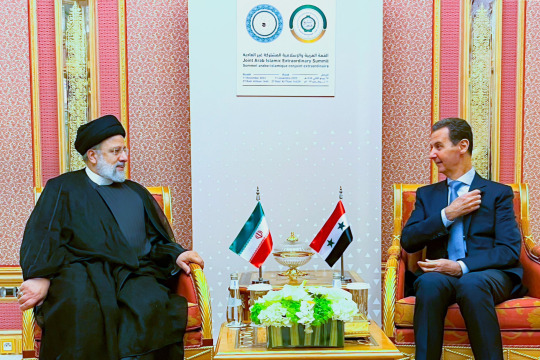
#Assad#Bashar al-Assad#Syria#Ebrahim Raisi#Hossein Amir-Abdollahian#Hossein Amirabdollahian#Iran#Raisi and MbS met so that's kinda a big deal#Riyadh#Saudi Arabia#Arab Summit#Arab and Islamic Countries Summit#Gaza#Gaza Strip#Palestine
5 notes
·
View notes
Text
What we know about the al-Ahli Arab Hospital explosion
on october 17 2023 there was explosion at al-Ahli Arab hospital, with the unverified death toll sitting anywhere from 500 to 1500
many blame israel, here's why
Reuters and Al Jazeera have accused Israel of being responsible, https://twitter.com/Reuters/status/1714354302196588656,
shortly afterwards Hananya Naftali posted this before swiftly deleting it
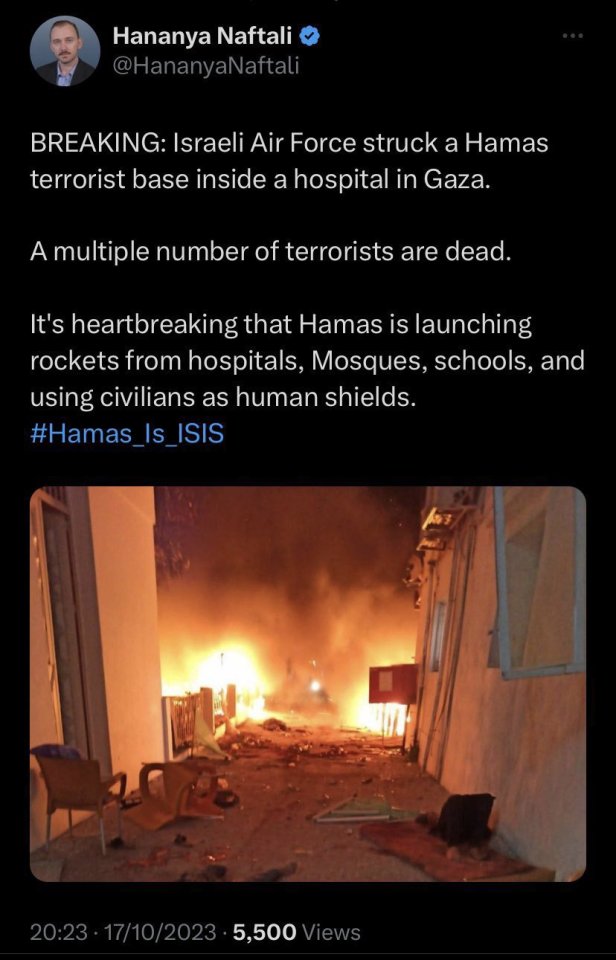
Then posting this

and this
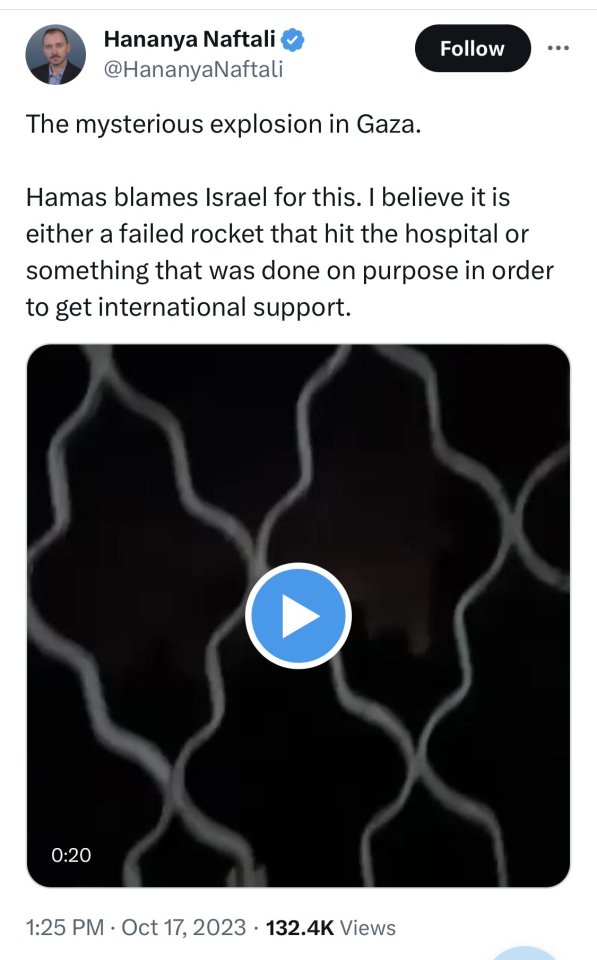
The story on who is responsible has changed multiple times and the details surrounding it has changed multiple times with Israel claim it was a Hamas bomb, then a failed missile strike, then fragments of a midair explosion, also blaming the palestinian islamic jihad who denies the accusation
Alongside these claims have been videos later proven to have been take at different times than explosion is claimed to have happen or from entirely different events https://www.rollingstone.com/politics/politics-news/misinformation-gaza-hospital-attack-1234856302/ raising doubts about the validity of any of israels claims
The above image and this link tweet contains the so only verified video of the explosion, it compares the sound to a confirmed israeli air strike, https://twitter.com/jason_paladino/status/1714386621834158137,
In response journalist Iona Craig tweeted: Having spent several months under airstrikes sometimes more than a dozen a night, often within 100 meters, it was the incoming whistle in this video that was the airstrike giveaway for me. You don’t forget that sound. “A fragment from a rocket” is not consistent with this. https://twitter.com/ionacraig/status/1714409916033540360
This is a hospital hospital that had been bombed before https://www.washingtonpost.com/world/2023/10/17/israel-hamas-gaza-hospital-anglican-church/#
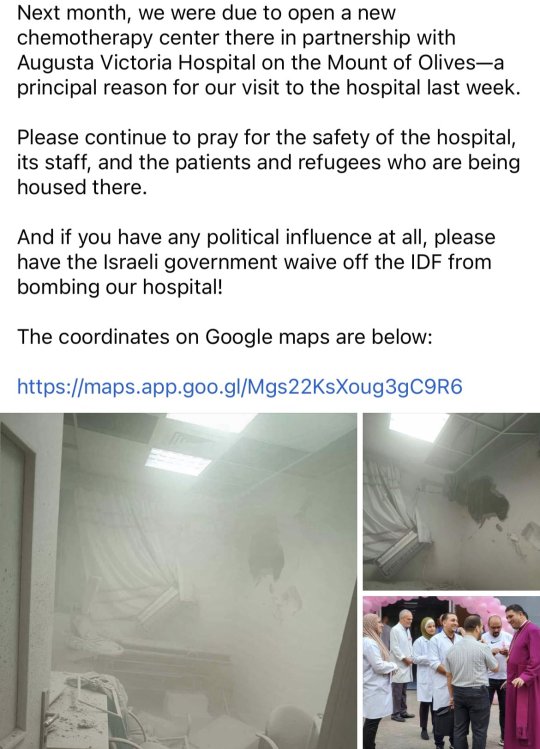
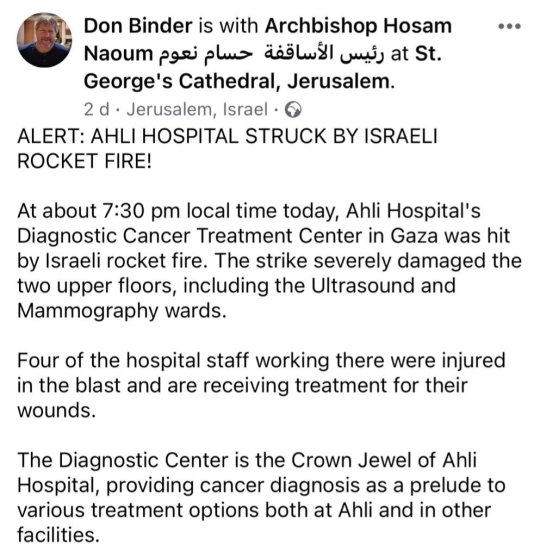
and is one of 51 attacks on health care facilities in gaza, meaning there is a precedent for israel bombing hospitals with this one having received orders to evacuate roughly 24 hours beforehand https://www.reuters.com/world/middle-east/attack-gaza-hospital-unprecedented-scale-who-says-2023-10-17/
The gaurdian has noted that "the scale of the blast appeared to be outside either of the militant groups’" , referring to Hamas and PIJ capabilitieshttps://www.theguardian.com/world/2023/oct/18/they-believed-it-was-safe-death-toll-rising-blast-gaza-hospital
A sentiment shared by MSBNC adding that this kind of firepower is consistent with Israeli strikes they also note that israel has a history of committing atrocities, denying them, then admitting months later alongside noting that the israeli army is claiming proof that they have refused provide. https://twitter.com/MirzaMahan/status/1714377238823469399
However
there has been one other video claiming to depict the bombing of the hospital, this one:
this video seems to coincide with timing of the accounts of the explosion, though has not been verified to depict the bombing, nor have i seen any english transcriptions that may add clarity. Others have noted that the video appears inconsistent with IDF accounts of the bombing. Also notable is that he source for this is Al Jazeera who still claims israel is responsible, which may weaken the idea that this depicts a palestinian missile being intercepted and hitting the hospital
Edit: account from hospital worker claiming there was the sound of two missiles, possibly weakening the above video as evidence as it depicts a lone missile
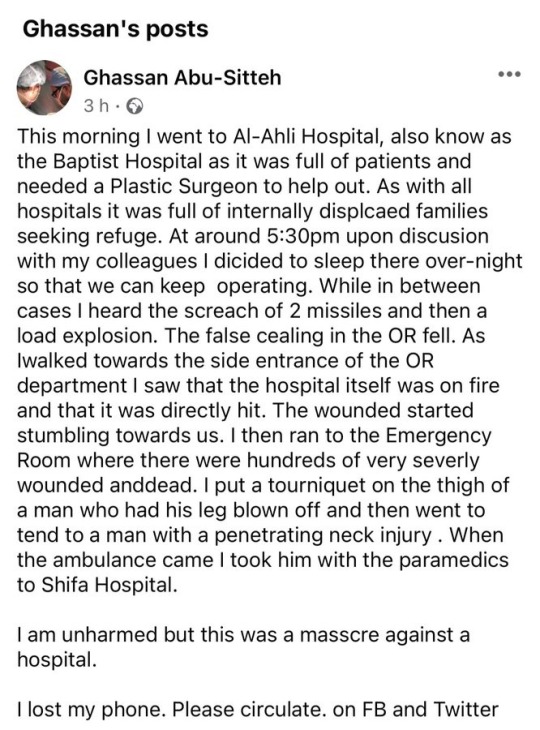
#gaza hospital#bombing#tw bombing#free gaza#free palestine#news#current events#israel#hamas#pij#idf#palestine
6 notes
·
View notes
Text
Why Arab countries seems to be ignoring pakistan in recent years….
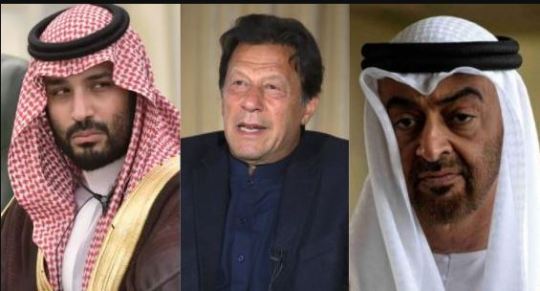
In the complex web of global diplomacy, alliances and friends are always calibrated. In recent years, there has been a noticeable shift in the dynamics between Arab countries and Pakistan.
In fact, during the recent G20 summit, Saudi Crown Prince Mohammed Bin Salman Al-Saud and the President of the United Arab Emirates (UAE) Mohammed Bin Zayed Al-Nahyan, visited India and returned, while there was no halt in Pakistan to engaging in any bilateral ties.
While there could be multiple reasons for this change, it is essential to examine the possible factors that have contributed to what appears to be a growing indifference towards Pakistan in the Arab region.
There could be multiple reasons ranging from the lack of governance to the rise of religious extremism, from anti-Arab sentiments to the perceived threat of exploitation of Arab resources. Experts have started to speculate about the growing distance between the Arab nations and the Islamic Republic of Pakistan.
However, Saudi Arabia and UAE will not forsake Pakistan fully, because of its strategic location, its status as a nuclear-armed nation, and its role as a major Muslim country in South Asia make it a valuable partner for these Arab nations. Moreover, creating new adversaries by mere forsaking, won’t be something the Arab nations would like.
Lack of stability and governance
The apparent indifference of Arab nations towards Pakistan in recent years can be largely attributed to concerns about Pakistan’s stability and governance.
Pakistan has grappled with a series of formidable challenges, resulting in an unstable political landscape and hindered economic progress. Consequently, this has led to a diminished level of credibility on the global platform.
The primary contributors to this instability are rooted in internal issues, including corruption, political discord and governance deficiencies. No prime minister in Pakistan has served the full term. They were either cooed or assassinated.
The prevailing “dog-eat-dog” phenomenon within Pakistan has, regrettably, acted as a regressive force, pulling the nation back into what feels like medieval times. This cutthroat environment, marked by ruthless competition has hampered the country’s progress and development.Just like any other nation, Arab countries seek to engage in partnerships with nations that exhibit stability and reliability, as these qualities are pivotal in fostering positive contributions to regional development.
Loyalty and Trust in Arab-Pakistani Relations
Arab countries’ perceptions of Pakistan are influenced significantly by the concept of loyalty and reliability as a friend.
Historically, Saudi Arabia, in particular, has been a steadfast supporter of Pakistan, offering substantial support, including financial bailouts and significant investments.
However, Pakistan’s ongoing challenges in repaying loans and recurrent financial crises have raised legitimate questions about its loyalty and commitment as a trusted partner.
In international diplomacy, every nation seeks stable and self-sufficient allies. When a country finds itself mired in financial turmoil and unable to meet its financial obligations, it inevitably strains its relationships with other nations.
This financial instability becomes a focal point in assessing the reliability of a partner. Consequently, addressing these financial challenges becomes paramount for Pakistan if it hopes to rekindle the trust and respect of its Arab counterparts.
Moving forward
It’s significant to stress that no one wishes ill for Pakistan as it is in the interest of regional stability to have a prosperous and secure Pakistan.
But Pakistan needs to understand that it can get the respect and attention it wants from Arab nations and the rest of the world by being a responsible and reliable country.
On the contrary, India has shown that it can keep its promises and work well with other countries, which has made people notice and respect India on the world stage. Pakistan can learn from India and aim to be a trustworthy partner that helps its region grow and stay peaceful.
The road to regaining its standing and influence in the international arena lies in Pakistan’s commitment to shut down extremism and terrorism completely, and its assurance to have responsible governance, diplomatic maturity, and constructive cooperation with its neighbours and the global community.
The author is a Saudi-based Indian national. He is Director of Milli Chronicle Media London. He holds a PG-Diploma in Artificial Intelligence and Machine Learning (AI-ML) from IIIT. He did a certificate program in Counterterrorism from the University of Leiden, Netherlands. He tweets under @ZahackTanvir. Views expressed are personal.
Moreover, many Pakistanis behave or act as if they are the sole protectors of Islam and Muslims. They often talk negatively about Arab leaders and governments in their private conversations, criticising them for not following Islam as they see it.
It’s important for them to understand that this kind of meddling and interference can create problems. Criticising the governments of the countries they’re in and trying to impose their own beliefs can lead to conflicts and misunderstandings.
In international relations, it’s essential to be respectful and not interfere in the affairs of the host nation.
Expatriate attitudes and their impact
While Indians, Americans, British, Sri Lankans and others typically come to these nations, earn their livelihoods and eventually return to their home countries, Pakistani expatriates sometimes exhibit a different mindset—one that involves laying claims over the resources of Gulf nations.
This trend has not gone unnoticed, and there are concerns that it could potentially lead to problems in host countries.
One particularly troubling example of this behaviour was exhibited by the hardliner cleric, Salman Hussein Nadwi, who maintained close associations with banned preachers Salman Audah and Yusuf Qardawi. Nadwi went as far as suggesting that the revenue of Saudi Arabia should be considered the property of the entire Muslim Ummah, and thus, Saudi Arabia should share its wealth with all Muslims.
Such claims and narratives, propagated by individuals like Nadwi, can potentially create discord and complications in the countries that host expatriate workers. They disrupt the harmony of the host nations.
#pakistan#economical condtion of pakistan#south asia geopolitics#unstability politics and economy of pakistan
1 note
·
View note
Text
Dear Brothers and Sisters, As-Salam-o-‘alaikum wa Rahmatullahi wa Barakatuhu,
Ramadan & Eid-ul-Fitr Mubarak, 1445 A.H. Mubarak and many more to come In shaa Allah, although a little late but it is never too late.
Because of current affairs, there is tremendous amount of demand for Holy Qur’an and Islamic Literature, especially from the U.S. Prison System, Al-Hamdo Lillah.
To meet with the requests, we have decided to provide these books at no cost to all those persons who ask for them and cannot afford to buy them, In shaa Allah,
We have prepared an estimated budget for the year 2024, as follows.
1,000 Copies, Holy Quran, Abdullah Yusuf Ali, English, Paper Back, US $1,000.00
1,000 Copies, Elementary Teachings of Islam, Abdul Alim Siddiqui, Arabic-English, Paper Back, Pocket Edition, US$ 2,000.00
2,000 Copies, A Brief Illustrated Guide for Understanding Islam, I. A. Ibrahim, Arabic-English, Paper Back, US$ 4,000.00 (to be reprinted)
Shipping Charges via USPS Media Mail to 1,000 persons, US $5.00 (Including Packing), US$ 5,000.00
TOTAL: US$ 12,000.00
Generosity is heavily encouraged during the last ten (10) nights of Ramadan. This is called Sadaqah, or voluntary charity, and can be in many forms, such as feeding someone a meal, donating to charity, performing a good deed, or doing an act of kindness.
وَتَعَاوَنُواْ عَلَى ٱلۡبِرِّ وَٱلتَّقۡوَىٰۖ نِۚ وَٱتَّقُواْ ٱللَّهَۖ إِنَّ ٱللَّهَ شَدِيدُ ٱلۡعِقَابِ
wa ta’aawanoo ‘alalbirri wattaqwaa; wattaqullaah; innAllaaha shadeedul ‘iqaab. SURAH AL-MA’IDAH AYAT 2 (5:2 HOLY QURAN)
We invite all of you to contribute to promote the Cause of Allah by propagating His Message through His Last Prophet Muhammad (SallaAllhu ‘alaihi wa Sallam), as advised by him during the Last Khutbah in Makkah, with your Charity, Khairaat, or Sadaqah or Zakat as a DONATION to the Islamic Center, P.O. Box 5192, 2807 Bedford Street, Johnstown, PA, 15904, United States of America.
ٱلَّذِينَ يُؤۡمِنُونَ بِٱلۡغَيۡبِ وَيُقِيمُونَ ٱلصَّلَوٰةَ وَمِمَّا رَزَقۡنَٰهُمۡ يُنفِقُونَ
Alladheena yu’minoona bilghaibi wa yuqeemoonas Salaata wa mimmaa razaqnaahum yunfiqoon; SURAH AL-BAQARAH, AYAT 3 (2:3 HOLY QURAN)
Islamic Center is registered with the Commonwealth of Pennsylvania as a Non-Profit Organization and has Tax Exempt Status with the Internal Revenue Service (IRS) with a Tax-Exempt ID number 25-1787579; therefore, your DONATIONS are TAX-DEDUCTIBLE.
You may send your Personal Check, Cashier Check or Money Order as a DONATION to Islamic Center P. O. Box 5192, 2807 Bedford Street, Johnstown, PA, 15904, United States of America, or
You may also deposit your DONATION directly into the account of Islamic Center at First Summit Bank, 606 Main Street, Johnstown, PA 15901, Johnstown, PA, 15904, United States of America. Account details are given below:
Routing Number: 031316815
Account Number: 6 014 606
Sincerely,
M. A. Qazi.
Phone: 814-535-355
URL: http://www.1stSummit.Bank
0 notes